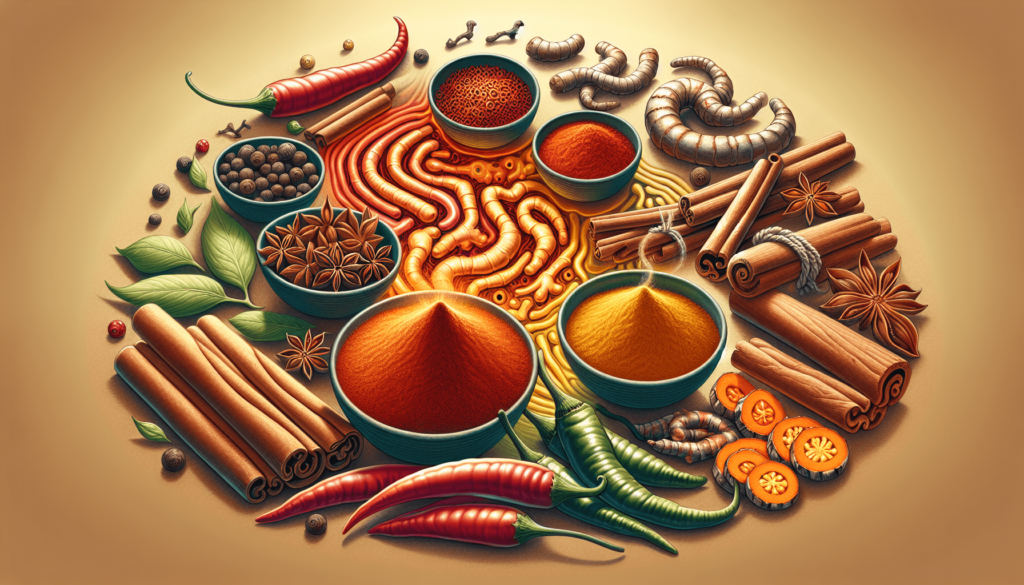Spices have been celebrated for their rich flavors and culinary benefits, but did you know they might also hold the key to protecting your gut health? That’s right, the antimicrobial properties found in certain spices have been gaining attention for their potential in fighting off harmful bacteria and promoting a healthy microbiome. In this article, we’ll explore the fascinating world of spices and their impact on gut health, revealing how these flavorful ingredients can be more than just a tasty addition to your meals. So, get ready to spice up your knowledge and discover the potential benefits of these aromatic wonders for your gut!
Introduction to Gut Health
Understanding the importance of a healthy gut
Your gut health plays a vital role in maintaining overall well-being. It not only affects your digestive system but also impacts your immune function, mental health, and even the condition of your skin. The gut is home to trillions of bacteria, collectively known as the gut microbiota, which aid in digestion, nutrient absorption, and play a crucial role in maintaining balance within your body.
Role of gut microbiota in overall health
The gut microbiota consists of a diverse array of microorganisms, including bacteria, yeasts, and viruses. These microorganisms coexist harmoniously, helping to break down food, produce vitamins, and support immune function. The balance of these microorganisms is essential for optimal health, as an imbalance can lead to various health issues such as digestive disorders, allergies, and even mental health conditions.
Antimicrobial Properties of Spices
Exploring the spices with antimicrobial properties
Spices have been used for centuries not only to enhance the flavor of dishes but also for their medicinal properties. Many spices possess antimicrobial properties, meaning they have the ability to inhibit the growth or kill microorganisms, including bacteria, viruses, and fungi. Some of the notable spices known for their antimicrobial properties include garlic, ginger, turmeric, cinnamon, and cloves.
Key compounds responsible for antimicrobial activity
The antimicrobial properties of spices are attributed to a variety of bioactive compounds present within them. For instance, garlic contains allicin, a compound known for its antimicrobial and immune-boosting properties. Ginger contains gingerol and shogaol, which possess antimicrobial and anti-inflammatory effects. Turmeric contains curcumin, a powerful antioxidant with antimicrobial activity. These compounds, among others, contribute to the overall antimicrobial properties of spices.

Link between Antimicrobial Properties and Gut Health
Research on the impact of spices on gut microbiota
Emerging research suggests that spices with antimicrobial properties can have a positive impact on gut health by influencing the composition and diversity of the gut microbiota. Studies have shown that certain spices, such as turmeric, garlic, and ginger, can help promote the growth of beneficial bacteria while inhibiting the growth of harmful pathogens in the gut.
Potential benefits of spices in maintaining gut health
The antimicrobial properties of spices may help maintain a healthy balance of gut microbiota, reducing the risk of gastrointestinal infections and digestive disorders. By inhibiting the growth of harmful bacteria, spices can create a more favorable environment for beneficial bacteria to thrive, thus contributing to improved digestion, nutrient absorption, and immune function.
Spices and Their Effects on Gut Microbiota
Effects of individual spices on gut microbiota diversity
Research has demonstrated that individual spices can significantly impact the diversity of the gut microbiota. For example, a study investigating the effects of ginger on gut microbiota found that ginger consumption increased the abundance of certain beneficial bacteria, such as Lactobacillus and Bifidobacterium, while reducing the levels of potentially harmful bacteria.
Modulation of gut microbiota composition by spices
Spices can also influence the overall composition of the gut microbiota. Turmeric, for instance, has been shown to enhance the growth of Akkermansia muciniphila, a beneficial bacterium associated with a healthy gut barrier function. Similarly, garlic has been found to promote the growth of Bifidobacterium and Lactobacillus, which are known for their health-promoting effects in the gut.

Promoting Gut Health with Spices
Using spices as a preventive measure against gut infections
Incorporating antimicrobial spices into your diet can serve as a preventive measure against gut infections. Spices like garlic, ginger, and cinnamon possess natural antimicrobial compounds that can help ward off harmful bacteria, viruses, and fungi, reducing the risk of developing infections and supporting a healthier gut microbiota.
Enhancing gut barrier function with antimicrobial spices
The gut barrier serves as a protective barrier, preventing harmful substances from entering the bloodstream. By promoting a balanced gut microbiota, antimicrobial spices can strengthen the gut barrier function, reducing the chances of inflammation and promoting better overall gut health.
Spices and Inflammatory Bowel Diseases
Exploring the potential role of spices in managing IBD
Inflammatory bowel diseases (IBDs) such as Crohn’s disease and ulcerative colitis involve chronic inflammation of the gastrointestinal tract. While spices alone cannot cure IBD, emerging evidence suggests that certain spices, including turmeric and ginger, may have anti-inflammatory properties that can help alleviate symptoms and support the management of these conditions.
Alleviating inflammation through spice consumption
Spices like turmeric, known for its potent anti-inflammatory compound curcumin, have been shown to reduce inflammation in the gut. Curcumin can inhibit specific enzymes and molecules involved in the inflammatory processes, helping to alleviate the symptoms associated with IBD and promote gut healing.
Antimicrobial Properties of Spices vs. Antibiotics
Comparing the effectiveness of spices and antibiotics
Spices with antimicrobial properties offer an alternative to antibiotics for managing certain gastrointestinal infections. While antibiotics are effective at killing bacteria, they can also disrupt the balance of the gut microbiota. Spices, on the other hand, possess natural compounds that can selectively target harmful microorganisms while preserving the beneficial bacteria in the gut.
Potential alternatives or complementary approaches
The antimicrobial properties of spices can be a promising alternative or complementary approach to conventional antibiotics. By incorporating spices into your diet, you can promote a healthier gut microbiota while reducing the risk of antibiotic resistance and minimizing the potential side effects associated with antibiotic use.
Safety Considerations and Precautions
Possible side effects of consuming large quantities of spices
While spices are generally safe when consumed in moderation, it is essential to be aware of their potential side effects. Some people may experience digestive issues such as heartburn or stomach upset when consuming large quantities of spicy foods. It is best to start with small amounts and gradually increase your intake while monitoring your body’s response.
Interactions with medications and existing health conditions
Certain spices may interact with medications or exacerbate existing health conditions. For example, ginger may interfere with blood clotting medications, and turmeric may intensify the effects of blood-thinning drugs. If you have any underlying health conditions or are taking medications, it is advisable to consult with a healthcare professional before incorporating large amounts of spices into your diet.
Incorporating Spices into the Diet
Cooking with antimicrobial spices
Incorporating antimicrobial spices into your diet can be as simple as adding them to your favorite dishes. For example, you can use garlic and ginger in stir-fries, turmeric in curries, and cinnamon in baked goods or smoothies. Experimenting with different spices can not only enhance the flavor of your meals but also provide potential health benefits.
Recommended portion sizes and frequency
While there are no strict guidelines for the portion sizes and frequency of spice consumption, it is recommended to consume a variety of spices in moderation as part of a balanced diet. Aim to include different spices in your meals and listen to your body’s response. As with any dietary changes, it is essential to maintain a balanced approach and ensure you are meeting all your nutritional needs.
Conclusion
Summary of the potential of spices in protecting gut health
In conclusion, the antimicrobial properties of spices offer promising potential for protecting gut health. These spices can influence the composition and diversity of the gut microbiota, promoting a healthier gut barrier function and reducing the risk of gastrointestinal infections. Furthermore, certain spices may help alleviate inflammation associated with inflammatory bowel diseases, although additional research is needed.
Future directions for research and application
While the existing research on the link between spices and gut health is promising, further studies are needed to better understand the mechanisms underlying these effects and to establish specific recommendations for spice consumption. Future research may explore the combination of spices with other dietary and lifestyle factors to optimize gut health and overall well-being.

